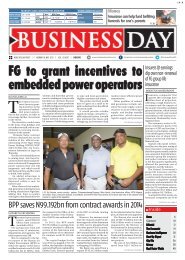You also want an ePaper? Increase the reach of your titles
YUMPU automatically turns print PDFs into web optimized ePapers that Google loves.
THISDAY • WEDNESDAY, MAY 20, 2015<br />
BUSINESSWORLD<br />
29<br />
INTERVIEW<br />
Onyemenam: Only People with Integrity Should<br />
Manage National ID Card Infrastructure<br />
The National Identity Management Commission was recently embroiled in a<br />
faceoff with aggrieved unionists who protested the sack of their colleagues. In this<br />
interview with journalists, the Director General/CEO, NIMC, Chris Onyemenam,<br />
clarifies the issues. James Emejo was there. Excerpts:<br />
The National Identity Management Commission<br />
(NIMC) has been facing some<br />
labour issues. What is really the crux<br />
of the matter?<br />
The main issue is that some members of<br />
staff who falsified their service records and<br />
thus have been profiting from that fraud were<br />
asked to go on account of a disciplinary process<br />
recently concluded. The issues at stake are<br />
fake appointment, promotion, conversion,<br />
and advancement letters and NIMC have<br />
had to follow the process as laid down in the<br />
rules and regulations for the Public Service to<br />
deal with such cases. The staff members had<br />
the opportunity for fair hearing, which is a<br />
Disciplinary Committee, set up to determine<br />
the extent of the fraud but they choose to go<br />
to court. It didn’t start yesterday, it didn’t<br />
start in 2014, it started in 2012, when the<br />
commission began the process of absorption of<br />
the Department of National Civic Registration<br />
(DNCR) staff and the payment of promotion<br />
arrears, which in itself started 2008.<br />
And so when they went to court in mid-2014<br />
to try to stop the process, we obeyed the<br />
court order and stopped. After seven to eight<br />
months, the case came to a close and the<br />
Commission won at the National Industrial<br />
Court. The court had decided that it was<br />
not possible for the Court to interfere with<br />
an administrative or a disciplinary process<br />
between an employee and an employer, and<br />
therefore, the Union, seeking an intervention<br />
of the Court to stop such a process on its<br />
behalf was an anomaly. We then took our<br />
time, to invite them again, this time in 2015 to<br />
come and clear themselves from the allegations<br />
following the queries issued, and some of<br />
them came, and a few were exculpated, and<br />
have since been issued their proper placement<br />
letters. Other felt it was till a court issue and<br />
failed to avail themselves the opportunity of<br />
an appearance that in its self is a violation<br />
of a public service rule.<br />
There are others who did not come and<br />
somehow, felt that Management should allow<br />
them to continue to profit from what we call<br />
a fraudulent act on their side. Which is not<br />
appropriate. By the way, we have reported<br />
the criminal aspect of this issue to the police.<br />
This is what is required of us because the<br />
criminal aspect of their conduct is not for us<br />
to deal with. It is the administrative aspect<br />
that has to do with discipline that is our<br />
responsibility, and we have gone through<br />
the whole process. There are public sector<br />
institutions that are supposed to help ensure<br />
that indeed an adequate and appropriate fair<br />
hearing were present at the disciplinary committee<br />
sittings: the office of the Secretary to the<br />
Government of the Federation (SGF), the Office<br />
of the Head of Civil Service of the Federation<br />
(OHCSF), Federal Civil Service Commission<br />
and he Federal Character Commission were<br />
all duly represented.<br />
However, the Union, representing staff<br />
members have decided for whatever reasons to<br />
resist the outcome of the disciplinary process,<br />
suggesting that they encourage such fraudulent<br />
acts, and clearly want to divert attention from<br />
the major facts and issues at hand.<br />
Where these staff not employed under<br />
your watch?<br />
No. This set of staff, were not employed<br />
by NIMC. They were among those whom<br />
the Commission had to take over from the<br />
defunct DNCR and essentially, if you take<br />
over the assets and liabilities of an institution,<br />
it is only proper that you look into the quality<br />
of the assets and liabilities you have inherited,<br />
to determine whether the ownership you are<br />
now being conferred with by virtue of the<br />
Onyemenam<br />
provisions of the Act that made it possible is<br />
acceptable. That enables you to decide on the<br />
next issues: trainings postings, redundancy,<br />
recruitments, among others.<br />
For these set of staff members, however,<br />
it has nothing to do with whether they are<br />
competent, whether they needed training, or<br />
whether they could fit into the new scheme.<br />
It had more to do more with the character of<br />
the person we are talking about. Because if<br />
you could falsify your own service records,<br />
and you expect to be given the responsibility<br />
to attend to and manage and operate personal<br />
information and the collection, processing and<br />
use of database that people should rely upon, it<br />
takes a lot away from the entire National Identity<br />
Management System (NIMS) infrastructure.<br />
If you have a character issue of that nature,<br />
it is indeed a huge issue if someone with a<br />
questionable integrity is the gatekeeper of the<br />
infrastructure that should help us achieve a<br />
secure identity system and that is the crux of<br />
the issue. The dilemma is what to do with a<br />
staff member who has put in several years<br />
of service including years during which he<br />
profited from fraudulent act he perpetrated<br />
which represents his character as inimical to<br />
the safety and future of the project.<br />
So why did your management choose<br />
now to swing into action?<br />
Really not sure your question is couched<br />
rightly, but here is the answer. This process<br />
started long ago. It was preceded by at least<br />
three verification exercises. First was the<br />
one we did in collaboration with the service<br />
providers approved by the Federal Executive<br />
Council in 2008 to enable us know the assets<br />
we were taking over in terms of numbers<br />
and categories. That led to the elimination<br />
of what we may refer to as ‘ghost workers’<br />
because they didn’t turn up for verification.<br />
Second was when they were to be sent back<br />
to the office of the Head of Civil Service, since<br />
they were pool staff. Then there was a third<br />
verification exercise which was jointly don with<br />
the office of the Head of the Civil Service of<br />
the Federation which was successfully done<br />
and brought out conclusively, the issues on<br />
which they were given opportunity to explain.<br />
That opportunity was given in June 2014 and<br />
the sitting of the Disciplinary Committee was<br />
delayed by the court action for about eight<br />
months s mentioned before. It was after the<br />
ruling of the court which was in our favour<br />
that we subsequently recommended the process.<br />
It happen to b now –March-April 2015. The<br />
Board gave its approval only last two week.<br />
What would you have done if you were<br />
in my shoes?<br />
I cannot because I am about to end my tenure<br />
in a couple of months, refuse to do my job<br />
properly, and thus pass on a liability or leave<br />
behind an organisation and infrastructure that<br />
will simply have an unintended consequence<br />
for my successor. One of the most important<br />
reasons why we embarked on the evaluation<br />
of the quality of the assets we took over, was<br />
first to be sure of what we were inheriting. The<br />
second thing is that if you want the unique<br />
identification system to be globally recognised<br />
and acceptable, we needed to benchmark our<br />
service and organizational infrastructure in<br />
terms of deployment and processes to accepted<br />
standards globally and one of the tools or index<br />
used is the information security management<br />
system.<br />
There are various levels of certifications for<br />
identity and database management infrastructure:<br />
the data centre, the data capture, network,<br />
connectivity, etc., and what that shows when<br />
you obtain these certifications simply put, is<br />
that you have a very good and safe identity<br />
management infrastructure. We wanted to<br />
ensure that that was in place, because one<br />
thing that can make you loose your certification<br />
overnight is if you have questionable integrity,<br />
and so we were always conscious of the need<br />
for background checks to be conducted as<br />
fast as possible so why leave these ones that<br />
we started to work on long ago because I am<br />
leaving office in about six months from now?<br />
It behooves on me as a responsible custodian<br />
to ensure that I am leaving behind a safe<br />
infrastructure, and these former colleagues<br />
wouldn’t help to ensure the safety of that<br />
infrastructure and it is inconsistent with the<br />
certification programmes that we have spent<br />
and labored so much to achieve so we needed<br />
to address this difficult choices and decisions<br />
to be made. Sur, it was difficult, but it have to<br />
find a way of making things work differently.<br />
Just not that this issue didn’t start yesterday,<br />
and it’s not like I am in a hurry to conclude<br />
the process. After all, the decision of the court<br />
which was in our favour was obtained on<br />
December 5th, 2014, and here we are today,<br />
May 11th, 2015. If I had wanted to quickly get<br />
it done, I would have done so in December.<br />
Third, government is a continuum that I am a<br />
Director General today and due to leave office<br />
November 27th, 2015 does not mean that I<br />
shouldn’t do what the Commission can do<br />
now. It is left to my successor to come in and<br />
say, this is not consistent with the rules and<br />
the regulations, he will still follow a process.<br />
And as long as we have followed the process,<br />
I really didn’t think there was any need, or<br />
was it right to pass on the problem.<br />
One of the allegations of the aggrieved<br />
unionist is that you want to sack their<br />
colleagues so you can recruit your cronies.<br />
How true is this allegation?<br />
Well, if I want to sack them and recruit<br />
my cronies, then the next person will sack<br />
those people and recruit his/her cronies<br />
and the vicious circle goes on. That is not<br />
public service operates please. That is not<br />
how countries develop, and that is not how<br />
institutions are built. We didn’t and I am<br />
not in the habit of doing that. There is a clear<br />
government policy which we adhered to. We<br />
advertised, and went to the Federal character<br />
commission and obtained the allocations for<br />
all the states and we adhered to that. In spite<br />
of the allocations, we still made sure that<br />
those who we picked up the slots for each<br />
states were people who merited it in terms of<br />
qualifications, age, experience, relevance etc.,<br />
and so, there is no truth in that allegation.<br />
CONT’D ON NEXT PAGE
















